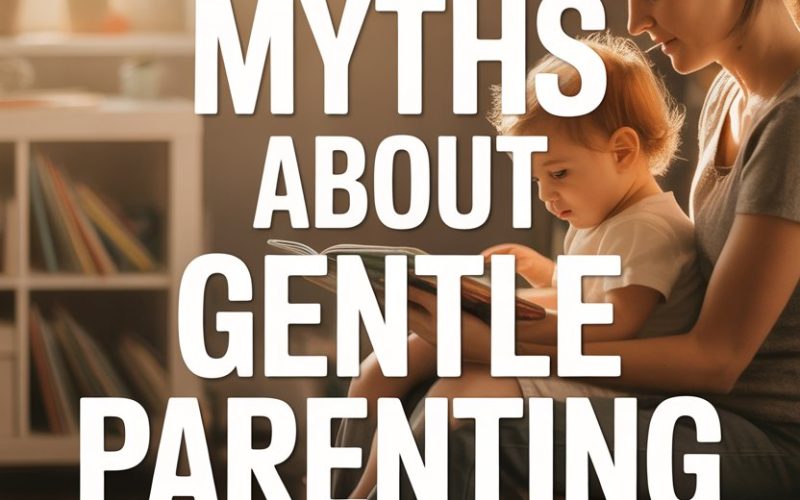Parenting trends come and go faster than you can say “screen time,” but gentle parenting seems to have made itself right at home in the playground chatter and social media feeds.
Its promise of raising kind, confident kids without bribery or yelling sounds lovely, but it also comes saddled with some pretty wild myths.
Time to roll up those sleeves (figuratively, unless you’re actually crafting this while eating spaghetti) and separate fact from fiction.
1. Gentle Parenting Means Letting Kids Run the Show
If one more person mentions “permissive parenting” in the same breath as gentle parenting, someone’s going to need a timeout.
Here’s the thing: gentle parenting is not code for letting kids rule the roost, paint the dog, or eat biscuits for every meal.
The heart of gentle parenting is about respecting children and guiding them with empathy, not swapping your authority for a surrender flag.
Boundaries and limits are set, but with kindness rather than threats. As Dr. Laura Markham explains, gentle parenting is about “respectful discipline, not permissiveness.”
Kids crave boundaries almost as much as they crave snacks. Setting them with warmth doesn’t make you a pushover, it makes you a safe anchor.
2. Gentle Parenting Is Just for Toddlers
Picture books, soft voices, and tantrum management—sounds like something for the preschool set, right? Not quite.
Gentle parenting evolves along with your child. Teenagers, with their eye rolls and headphone fortress, need compassionate limits and emotional support just as much as a three-year-old does.
Shouting “Because I said so!” at an adolescent only teaches them to tune you out faster. A study from the University of Pittsburgh found harsh discipline in teens was linked with increased lying and risky behaviour—hardly the goal.
Gentle parenting adapts. For a toddler, it’s naming feelings; for a teenager, it’s active listening and collaborative problem-solving.
Yes, even if their problem is “My socks feel weird.”
3. Gentle Parenting Means Never Saying “No”
Here’s where things get muddier than a rainy day at the park.
The myth goes something like this: gentle parents only whisper affirmations, never uttering the dreaded N-word (no, not that one—the other one).
Can we please set the record straight? “No” exists in the gentle parenting vocabulary. The difference is in how it’s used.
Instead of barking “No!” across the room, gentle parenting encourages explanations and alternatives—“The marker stays on paper, not the wall. If you want to draw, here’s some paper.”
The magic isn’t about never refusing, but about making refusals part of a respectful relationship.
Turns out, “No, you can’t put the cat in the washing machine,” goes down easier when you offer a safe alternative (like a cardboard box fort).
4. Gentle Parenting Is Unrealistic for Busy Parents
Ever heard someone sigh, “I’d love to parent gently, but I don’t have hours to philosophise with my kid about snack choices”? You’re not alone.
The assumption is, if you don’t have the patience of a saint and unlimited time, gentle parenting isn’t for you.
Here’s a secret: gentle parenting isn’t about lengthy negotiations or daily TED Talks. Sometimes it’s as simple as pausing to take a breath before responding.
One study from the University of Washington showed that even small increases in parental warmth and positive interactions can have a significant impact on behaviour.
You don’t need to be a Zen master or give up your coffee. Gentle parenting fits into the nooks and crannies of real life. A hug before school.
A calm “I see you’re frustrated” after a meltdown. Tiny moments, big difference.
5. Gentle Parenting Means You Never Lose Your Cool
Picture-perfect Instagram feeds would have you believe gentle parents are always composed, speaking in gentle tones even as the dog trails mud through the lounge.
Reality check: everyone loses their cool sometimes. (If you haven’t, are you even parenting?)
Gentle parenting isn’t about flawless self-control. It’s about repair.
When you do snap—maybe you yell, maybe you mutter something unprintable into the fridge—it’s about coming back to your child, apologising, and showing them how to make things right.
Research highlighted by Harvard’s Center on the Developing Child underscores the power of repairing ruptures in relationships.
Kids don’t need perfect parents; they need real ones who show what it looks like to mess up and make amends.
6. Gentle Parenting Will Make Your Kids ‘Soft’
What if being gentle breeds kids who can’t cope with the real world—a world that, let’s be honest, sometimes resembles a toddler with a missed nap?
Critics sometimes warn that a kindness-first approach will leave children ill-equipped for challenges or discipline.
The evidence says otherwise. Raising kids with empathy and respect actually strengthens their resilience.
According to Dr. Daniel Siegel and research on mindful parenting, children who feel connected and understood develop better self-regulation skills and emotional intelligence.
Kindness doesn’t mean weakness. It’s the foundation for grit.
When children know they’re loved even when they’ve made mistakes, they become more likely to try again—and to treat others with compassion too.
7. Gentle Parenting Is a Passing Trend
Every few years, a new parenting style hits the shelves (and your WhatsApp group threads) promising miracles. Some folks dismiss gentle parenting as just another flash-in-the-pan idea, destined to fade like fidget spinners.
Not so fast. The principles behind gentle parenting—empathy, respect, clear boundaries—are rooted in decades of research in child psychology and brain development.
Attachment theory, for instance, has been studied since the 1950s and still underpins most of what we know about how kids thrive.
While the hashtags might change, the science backing up gentle parenting has staying power. It’s not about following a trend—it’s about using what works for real families, through every stage of childhood and beyond.
Growing with Your Kids
Gentle parenting isn’t about reaching a mystical level of calm or memorising the right script.
It’s about building a relationship with your child that holds up, even when life gets messy (and, let’s be honest, parenthood is mostly “messy”).
Swapping old myths for reality helps parents let go of guilt and try what actually works.
Tonight, you might not nail it. You might still lose your patience or give in to another biscuit request.
That’s fine. The magic of gentle parenting is in the next moment—the choice to pause, connect, and try again.
Tea (or wine) in hand, you’ve got this.




